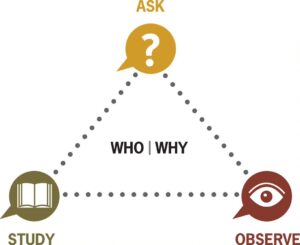Sep 27, 2012
When designing any learning event, the Dialogue Education method demands that you develop in advance a deep understanding of who will participate, taking into account their individual experience and needs so that you can tailor the design specifically for them; any learning event that makes too many assumptions about the participants is bound to disappoint.
In our foundational courses, we use a simple tool called the ASO Triangle – Ask-Study-Observe – which provides you with a straightforward way of truly getting to know your participants so that you can develop an exceptional learning event.

This blog post gives you a snapshot of the first leg of the triangle: ASK!
(What follows is excerpted from the book, Dialogue Education Step by Step: A Guide for Designing Exceptional Learning Events – by Darlene Goetzman the e-book covers the full ASO Triangle, with helpful examples and suggestions for work you can do with this tool).
ASK
In the ASK dimension, you will need to decide who you will ask, what you will ask, and how will you ask it.
WHO TO ASK
Who can tell you about the situation, the learners, and what content is most important for this particular learning event? You want a range of opinions and insights, acknowledging that there are some decisions that will have been made for you and the learners. Here are a few examples of the types of people you might consider speaking to, depending, of course, on the field in which participants are working and the content you will be teaching :
- Clients
- Former clients
- Family members
- Staff
- Supervisors
- Case counselors
- Department directors
- Lead trainers
- The CEO
- Nurses
- Foremen . . .
WHAT TO ASK
Here are 8 suggested questions to ask your learners – what would you add?
- Which content is most important? Why?
- What is missing?
- What could be omitted?
- What information will help you make choices about the content you’ll be teaching?
- What are the expectations of the leadership, the learners, and the other stakeholders?
- What would make the greatest difference for this group of learners? Their lives? Their work? Their health?
- Who could be a resource to help you create relevant case studies or provide other types of examples to make the content real and engaging?
- For the more experienced people involved in the learning event, what challenges have they have seen or experienced when they were first learning how to (or learning about) ___________? What helped and would have helped their progress the most?
HOW TO ASK
Consider how much time you have and how best to learn what is needed during that time by soliciting a range of views to give you the big picture. Even with very little time you can always take a sample that represents the full range of views. You can conduct surveys that ask a variety of questions (open, ranking, multiple choice) or conduct formal or informal interviews. Each of these methods can be completed face-to-face, by phone, e-mail, or mail.
What might you add to the task of asking? What’s worked for you?
*******
This post by Darlene Goetzman



